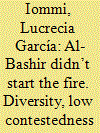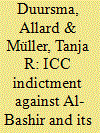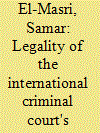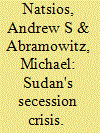| Srl | Item |
| 1 |
ID:
177736


|
|
|
|
|
| Summary/Abstract |
This paper contends that despite it functioning as a catalyst, the ICC “Africa problem” did not start with the arrest warrant against al-Bashir. To fully comprehend the current legitimacy crisis we must understand the nature of the negotiation process that led to the adoption of the Rome Statute and its enduring impact. In particular, we must acknowledge the uneven ability of states to formulate and signify their preferences on the basis of their identity and interests during the negotiation process. Drawing from Wiener’s theory of contestation, the paper contends that the absence of meaningful engagement with issues germane to some ICC stakeholders before and during the Rome Conference facilitated the adoption of the Rome Statute, but also plausibly created difficulties for the Court in the long run. Specifically, it postponed unavoidable conflict over contentious issues and undermined the likelihood that specific stakeholders would develop a sense of ownership over the Statute.
|
|
|
|
|
|
|
|
|
|
|
|
|
|
|
|
| 2 |
ID:
166684


|
|
|
|
|
| Summary/Abstract |
The impact of the International Criminal Court (ICC) on peace processes has received much scholarly attention. We argue, based on the ICC arrest warrant against Sudanese President Omar al-Bashir, that ICC indictments against government officials not only can be detrimental to the prospects for peace, but can also negatively affect everyday practices of peacekeepers and humanitarian workers. We draw on a combination of quantitative and qualitative data in order to develop our argument. We interrogate some measurable consequences of the indictment in relation to the work of the United Nations – African Union Mission in Darfur (UNAMID) as well as humanitarian actors in Darfur. We do so using a data set compiled to support the work of UNAMID. We also draw on interviews with UN and UNAMID staff, aid workers, and representatives of the conflict parties. Our analysis shows that the indictment of President al-Bashir was perceived by the Sudanese government as the continuation of a confrontational approach pursued by the international community. We further show that the indictment accelerated patterns of obstruction and intimidation of peacekeeping actors, other third-party actors, and local staff associated with these. This complicated the everyday activities of peacekeepers and humanitarian efforts.
|
|
|
|
|
|
|
|
|
|
|
|
|
|
|
|
| 3 |
ID:
106834


|
|
|
| 4 |
ID:
110982


|
|
|
|
|
| Publication |
2012.
|
| Summary/Abstract |
Sudan and South Sudan signed a non-aggression treaty in the Ethiopian capital Addis Ababa on 10 February, which African Union (AU) mediators hope will calm growing tensions between the two countries. Thabo Mbeki, the former president of South Africa and chief African Union mediator, told reporters both sides had agreed to respect the sovereignty and territorial integrity of the other. He was speaking after the first meeting between Sudan and South Sudan in a new round of talks aimed at addressing the numerous post-secession issues that have thus far eluded agreement, contributing to increasingly belligerent rhetoric from both sides. Underpinning the treaty, a new monitoring mechanism was created to investigate any allegations of violations by either side. However, it is unclear how this will be implemented in the remote border areas where most confrontations to date have occurred.
|
|
|
|
|
|
|
|
|
|
|
|
|
|
|
|
| 5 |
ID:
100567


|
|
|
|
|
| Publication |
2011.
|
| Summary/Abstract |
Ahead of last weekend's secession referendum in Sudan, Andrew S. Natsios and Michael Abramowitz wrote on the prospects for compromise and reconciliation between the country's north and south.
|
|
|
|
|
|
|
|
|
|
|
|
|
|
|
|